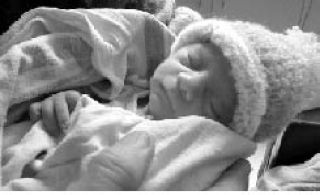Motherhood
On March 28, with six weeks to go until my due date, my midwife worried that the baby’s growth had slowed. She ordered an ultrasound.
The technician started out chatty as she squirted goo on my tummy and flashed grey blobs on the screen. Then she fell silent. The doctor, too, looked gravely at the screen and didn’t say anything. They sent me straight to the hospital, sheet of indecipherable medical jargon in hand.
The midwife broke the news no one wants to hear: “We are on the verge of losing your baby. It’s not your fault. It’s just really bad luck.” The umbilical cord had attached to a thin spot in the placenta, and she wasn’t getting the nutrients she needed. She wouldn’t survive much longer under those conditions.
I thought of the first time she put a microphone on my then-flat tummy to hear the baby’s heartbeat, quick as a hummingbird. I thought of the generous Freecyclers who donated face paint so my mom and sister could decorate my belly like a fancy egg on Easter. I thought of the kids at Chautauqua, the first to ask if I was pregnant (or, once, just getting fat) when I came into their classrooms to substitute.
Not now, I thought. Not after coming this far.
A nurse came in to strap monitors on my belly and an insert an IV in my wrist, both of which rolled next to me on endless laps around the maternity ward, and even to the bathroom.
Twenty-nine hours later my daughter was born, one arm up by her head like Superman taking to the skies. For a few minutes she lay in my arms, unbelievably tiny and perfect. We named her River Sophia.
I came home from the hospital with a huge electric breast pump, inaptly named “symphony,” instead of my baby. For the next three weeks I drove in every day to make milk deliveries and hold her.
Six weeks early is a pretty good start to life, but River needed to stay in a temperature-controlled isolette for a while, and basked under what we called “grow lights” to prevent jaundice. Most difficult for me was the feeding tube in her nose because she simply didn’t have the energy to eat every meal on her own.
I grew up on Vashon. My early years were spent strapped to my mom’s back as she tilled the garden and pressed cider, with sheep as my babysitters and sand from KVI filling every pair of my shoes. The sterile environment and fluorescent lighting in the nursery seemed a profoundly wrong first experience of the world. I brought my iPod and played Copeland’s “Fanfare for the Common Man” to drown out the incessant beeping of the monitors and tried my best to be patient as her little body got stronger.
But patience wasn’t coming easy. Before this I was a nice driver, one of those people who will hold up the whole line of ferry traffic to let someone out of the library parking lot or move way into the other lane to go around pedestrians.
My daily commute into the big city temporarily turned me into an irritated speed demon who ran every yellow light and cut people off simply because I’d stopped noticing other cars around me. I was away from home for eight hours a day, just to hold River for three. Usually a premature baby is kept in the hospital until the original due date. We were lucky to cut that time in half.
When we brought River home, our dog welcomed her with a thorough face-licking. The cats, who thoughtfully pre-warmed her crib, needed relocating before we put the baby down for a nap.
When the weather warmed, River met her first tree, a stately maple in our backyard, and gazed up through its branches as only a baby can. She snuggled comfortably into our dandelion-strewn lawn and didn’t mind the beetle that tickled its way across her leg.
This morning, when I carried her out to get the mail, she scowled when a raindrop hit her square between the eyebrows. OK, so living with nature is not always idyllic. It sure beats an isolette.
Amelia Powers, a former substitute teacher at Chautauqua
Elementary School, has lived on Vashon all her life.



